
|
|
|
|
 |
 |
| INDUSTRIAL FORUM |
|
 |
| . |
|
|
Rezal Khairi Ahmad
NanoMalaysia Berhad, Malaysia
Industrial Forum
Dr. Rezal Khairi Ahmad was appointed as the Chief Operating Officer of NanoMalaysia in June 2012. As NanoMalaysia first employee, he crafted the company structure, developed business model and corporate positioning strategy relative to like-minded government agencies and relevant industries In February 2013, Dr Rezal’s appointment was upgraded to Chief Executive Officer.
|
|
|
|
|
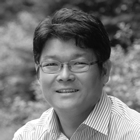 |
| INDUSTRIAL FORUM |
|
 |
| . |
|
|
Jong-Hyun Ahn
Yonsei University, South Korea
Industrial Forum
Jong-Hyun Ahn holds Underwood distinguished professor at Yonsei University, Korea. He has worked as a director of the Center for strain engineered electronic devices, supported by National Research Foundation of Korea and an associate editor of NPG Asia Materials. His research includes fundamental and applied aspects of nanomaterials and fabrication for flexible and stretchable electronic devices, and recent interest focuses on 2D material based wearable electronics with an emphasis on bio-applications. Jong-Hyun Ahn has authored more than 150 papers, and is an inventor of more than 60 patents and has received numerous scientific awards, including the National Young Scientist Award and the IEEE George Smith Award.
|
|
|
|
|
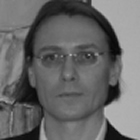 |
| INDUSTRIAL FORUM |
|
 |
| . |
|
|
Jouni Ahopelto
VTT, Finland
Industrial Forum
Prof. Jouni Ahopelto is within VTT Microsystems and Nanoelectronics, which is a part of the Technical Research Centre of Finland. His research interests include single and dual gate silicon-on-insulator devices, mesoscopic semiconductor structures, such as self-organising quantum dots, single electron devices, semiconductor-superconductor devices, nanophotonics, nanophononics and protein-based structures. The activities include also nanoimprinting lithography. He has published about 280 journal and conference papers on these topics. He has participated several EU projects as contractor, including projects Q-SWITCH, NEAR, NANOTECH, CHANIL, EUROSOI, EXTRA (as coordinator), PHAT, IP NaPa (as coordinator) and the NoE PhOREMOST. Currently he is in projects SUBTLE, NANOPACK and ROD-SOL and coordinating the NaPANIL IP. At national level the activities include participation in National Nanotechnology Programme 1997-1999 (Tekes), Electronic Materials and Microsystems Programme 2000-2003 (Academy of Finland) and Future Electronics Programme 2003-2006 (Academy of Finland). Prof. Ahopelto is the national representative on Finland in the Scientific Council Committee of European Nanoelectronics Platform ENIAC
|
|
|
|
|
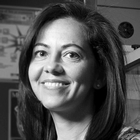 |
| WORKSHOP 2 |
|
 |
| . |
|
|
Hatice Altug
EPFL, Switzerland
Invited – Workshop 2: Biosensors and Medical Applications
Hatice Altug received her Ph.D. degree in Applied Physics from Stanford University in 2007. In 2013, Dr. Altug joined EPFL as an associate professor of Biomedical Engineering. From 2007 to 2013, she has been assistant/associate professor of Boston University Electrical and Computer Engineering and Biomedical Engineering departments. Dr. Altug is the recipient of Optical Society of America Adolph Lomb Medal, U.S. Presidential Early Career Award for Scientists and Engineers (PECASE), U.S. Office of Naval Research (ONR) Young Investigator Award, U.S. National Science Foundation CAREER Award, Massachusetts Life Science Center New Investigator Award, IEEE Photonics Society Young Investigator Award. She received Intel Graduate Student Fellowship, IEEE Photonics Society Graduate Student Fellowship. She is the winner of the Inventors' Challenge competition of Silicon Valley in 2005, best paper and research excellence award by IEEE Photonics Society in 2005. She has been named to Popular Science Magazine's "Brilliant 10" list in 2011.
|
|
|
|
|
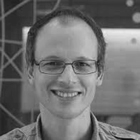 |
| INVITED |
|
 |
| . |
|
|
Adrian Bachtold
ICFO – The Institute of Photonic Sciences, Spain
Invited – Plenary Session
University Degree: PhD in Physics, University of Basel (CH)
Position at ICFO: Group Leader ICFO Professor, ERC Advanced Grant Award
Research Areas: Nanophotonics
Research Group:
Quantum NanoMechanics
Research Topics:
Graphene quantum nanomechanics
Electron spin resonance (ESR) measurements on single molecules
Superfluid Helium on Carbon Nanotube
Mechanical resonators based on semiconductor monolayers
Nuclear magnetic resonance (NMR) measurements on single nuclear spins
Mass Sensing with Nanotube & Graphene Mechanical Resonator
|
|
|
|
|
 |
| INDUSTRIAL FORUM |
|
 |
| . |
|
|
James Baker
National Graphene Institute - University of Manchester, UK
Industrial Forum
Business Director - Graphene@Manchester - National Graphene Institute at University of Manchester.
After 25 years in the defence, aerospace and security market leading and managing high technology businesses I am now Business Director for Graphene@Manchester. Graphene, the exciting and emerging disruptive technology first isolated at The University of Manchester - now looking to develop a number of commercialisation opportunities in partnership with industry together with the National Graphene Institute (NGI) and the Graphene Engineering Innovation Centre (GEIC) in The University of Manchester.
Strategic thinker and experience in delivering in complex challenging and changing business environments. Experience in technology and innovation, working in partnerships and collaborative environments. Promoter of Open Innovation and importance of skills and STEM agenda through various representative roles and media activities.
|
|
|
|
|
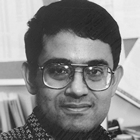 |
| INDUSTRIAL FORUM |
|
 |
| . |
|
|
Sanjay Banerjee
The University of Texas at Austin, USA
Industrial Forum
Dr. Sanjay Banerjee is the Cockrell Family Regents Chair Professor of Electrical and Computer Engineering and the Director of the Microelectronics Research Center in the Department of Electrical & Computer Engineering at The University of Texas at Austin.
He received his B.Tech from the Indian Institute of Technology, Kharagpur, and his M.S. and Ph.D. from the University of Illinois at Urbana-Champaign in 1979, 1981 and 1983 respectively, all in electrical engineering. As a Member of the Technical Staff, Corporate Research, Development and Engineering of Texas Instruments Incorporated from 1983-1987, he worked on polysilicon transistors and dynamic random access trench memory cells used by Texas Instruments in the world's first 4Megabit DRAM, for which he was co-recipient of the Best Paper Award, IEEE International Solid State Circuits Conference, 1986.
He has been Assistant Professor (1987-90), Associate Professor (1990-93), and Professor (1993-) at The University of Texas at Austin. He has over 530 archival refereed publications/talks, 7 books/chapters, and 26 U.S. patents. He has supervised over 40 Ph.D. and 50 MS students. He received the Engineering Foundation Advisory Council Halliburton Award, 1991, the Texas Atomic Energy Fellowship (1990-1997), Cullen Professorship (1997-2001) and the NSF Presidential Young Investigator Award in 1988. His recent awards include the Distinguished Alumnus Award, IIT (2005), Industrial R&D 100 Award (with Singh in 2004), ECS Callinan Award, 2003, IEEE Millennium Medal, 2000 and SRC Inventor Recognition Award, 2000. He is a Fellow of IEEE, Distinguished Lecturer for IEEE Electron Devices Society, and was the General Chair of the IEEE Device Research Conference, 2002. He is currently active in the areas of ultra high vacuum and remote plasma-enhanced chemical vapor deposition for silicon-germanium-carbon heterostructure MOSFETs and nanostructures. He is also interested in the areas of ultra-shallow junction technology and semiconductor device modeling.
|
|
|
|
|
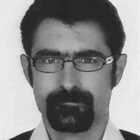 |
| INDUSTRIAL FORUM |
|
 |
| . |
|
|
Laurent Baraton
ENGIE, France
Industrial Forum
Senior Research Engineer in Nanotechnologies @ ENGIE Lab CRIGEN
|
|
|
|
|
 |
| WORKSHOP 1 |
|
 |
| . |
|
|
Dimitri Basov
Columbia University, USA
Invited – Workshop 1: Optoelectronics and Nanophotonics
Dmitri Basov is a Professor of Physics in the Department of Physics at Columbia University. His research focuses on electronic phenomena in quantum materials that he investigates using a variety of nano-optical techniques developed in his laboratory
|
|
|
|
|
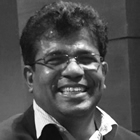 |
| INDUSTRIAL FORUM |
|
 |
| . |
|
|
Siva Böhm
Talga Advanced Materials GmbH, Germany
Industrial Forum
Dr. Siva Böhm received his first degree in Berlin in Chemical Engineering and an M.Sc. in Applied Chemistry at Hahn Meitner Institute (MPI) in Berlin. After gaining his PhD at the University of Bath in the field of Chemistry/Electrochemistry, Dr. Böhm worked as scientific officer and research fellow at different academic institutions; University of Wales Swansea, TU Delft and the University of Birmingham. During 2014 – early 2016, he was an honorary visiting Professor at India Institute of Technology Bombay working in the field of synthesis of Graphene and its applications in protective coatings, corrosion protection, energy harvesting and storage, construction materials, leightweight composite as well as sensors. Dr. Böhm has 16 years of industrial research experience (Tata Steel & Tata Group) in various research fields; metallurgy, corrosion inhibition, protective coatings in construction, electrical steel and automotive industry, functional and smart coatings and various aspects of nanotechnology, including synthesis and applications of Graphene. He is responsible for developing and implementing a number of new products at commercial scale, holds 26 patents and has written over 85 scientific publications. Since 2016, Dr. Böhm works as Chief Technology Officer at Talga Technologies Ltd, Cambridge UK & Talga Advanced Materials GmbH, Germany, where he is focussing Swedish Ore to very Few layer Graphene and developing value-added products using industrial high volume Graphene, Graphite and Graphite Ore. Dr. Siva Böhm is a Member of Royal Society of Chemistry with a charted chemist status and Fellow of Technical of Surface Coatings & Oil and Colour Chemist Association. In addition, he is reviewer for several peer-reviewed journals and a member of the editorial board at Flatchem. Recently, Siva has been awarded the Royal Society Industrial Fellowship.
|
|
|
|
|
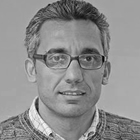 |
| INDUSTRIAL FORUM |
|
 |
| . |
|
|
Francesco Bonaccorso
IIT-Graphene Labs / BeDimensional, Italy
Industrial Forum
Francesco Bonaccorso gained a PhD from the Department of Physics, University of Messina in Italy after working at the Italian National Research Council, the Engineering Department of Cambridge University (UK) and the Department of Physics and Astronomy of Vanderbilt University (USA). In June 2009 he was awarded a Royal Society Newton International Fellowship at the Engineering Department of Cambridge University, and elected to a Research Fellowship at Hughes Hall, Cambridge. In April 2014 He joined the Istituto Italiano di Tecnologia, Graphene Labs. He was responsible in defining the ten years scientific and technological roadmap for the graphene flagship programme. His research interests encompass solution processing of carbon nanomaterials (such as graphene, nanotubes and nanodiamonds) and inorganic layered materials, their spectroscopic characterization, incorporation into polymer composites and application in solar cells, light emitting devices, lithium-ion batteries and ultrafast lasers.
|
|
|
|
|
 |
| INDUSTRIAL FORUM |
|
 |
| . |
|
|
Paolo Bondavalli
Thales Research & Technology, France
Industrial Forum
Dr. Paolo Bondavalli, Msc, PhD, Hdr is the Head of Nanomaterial team at Thales Research and Technology (CNRS/Thales, UMR137) and he is a member of the Nanocarb Lab. (joint team Ecole Polytechnique/Thales). His research has principally dealt with carbon nanotubes gas sensors and silicon nanowires for biological detection. In the last two years, he is the first author of several scientific papers (see refs in project) dealing with CNTFET based sensors, supercapacitors and of 6 patents dealing with gas sensors, thermal management through CNTs, nanomaterials deposition, supercapacitors and memristor-like structures. Presently his work is focused on the development of new materials (e.g. graphene, cnts, nanowires) for the new generation of electronics devices and for energy storage applications and memristor. Dr Bondavalli has received his Hdr in 2011, at Paris-Sud on a work on "devices based on random network of carbon nanotubes". He is EU expert, and Vice-Chairman, for Marie Curie Fellowships (EIF, IIF, OIF, CIG, IRSES), NMP and ICT panel, for the French National Research Agency (ANR), EDA, Eureka and reviewer for IOP, ACS, IEEE, ECS, Elsevier, EPJ B, Bentham, Taylor & Francis... During the last five years, he has participated, also as coordinator, in several EU projects (concerning MEMS, MOEMS, CNTs, graphene, spintronics) and ANR projects. He is involved in the Graphene Flagship initiative (Energy and High-frequency WPs).
|
|
|
|
|
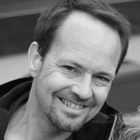 |
| INDUSTRIAL FORUM |
|
 |
| . |
|
|
Chris Bower
Emberion, Finland
Industrial Forum
Research Director at Emberion Limited.
Innovative scientist with a track record of technical problem solving across broad areas of physics, chemistry, and materials science, with recent emphasis on nano-materials and graphene. I currently work with a group of engineers and scientists who are developing new methods and processes for the scalable manufacture of ground-breaking, graphene-based sensor devices.
|
|
|
|
|
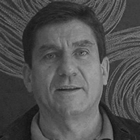 |
| WORKSHOP 3 |
|
 |
| . |
|
|
Luis Brey
ICMM - CSIC, Spain
Invited – Workshop 3: Theory & Simulation
Luis Brey’s interests are in the areas of mesoscopic physics, two-dimensional electron gas, diluted magnetic semiconductors, quantum Hall effects and complex oxides. In the last years his research has focussed on the study of electronic properties of manganites, graphene and topological insulators.
Luis Brey obtained his phD in Condensed Matter Physics at the University Autónoma de Madrid in 1987. He then spent two years at Harvard University as post-doc and two years as assistant professor at the Universidad Autónoma de Madrid. In 1993 he joined the Instituto de Ciencia de Materiales de Madrid-CSIC. He was guest scientist for several periods in the Max Plank Institute at Stuttgart, at ATT-Bell Laboratories at Murray Hill and visiting professor at Cambridge University.
|
|
|
|
|
 |
| INDUSTRIAL FORUM |
|
 |
| . |
|
|
Chester Burtt
Grafoid Inc., Canada
Industrial Forum
Director of Communications and Government Affairs, Grafoid Inc., Canada.
Mr. Burtt brings more than 30 years of sophisticated corporate and political communications-related experience to Grafoid. He is President of Chester Burtt & Associates Ltd. (“CBAL”), a corporate and public affairs advisory firm that specializes in connecting private and public companies with domestic and international opportunities. CBAL also arranges for the provision and supply of financial services in mergers, acquisitions and joint ventures. Working through an international network and associate firms, CBAL has a 25-year history of offering a full range of services to assist companies with strategy development and decisions to best suit their investor and corporate relations. Mr. Burtt graduated with a B.A. (Honours) from Waterloo Lutheran University and an M.A. from Wilfrid Laurier University in Political Science. Mr. Burtt also sits on the Board of Directors of Focus Graphite Inc.
|
|
|
|
|
 |
| INVITED |
|
 |
| . |
|
|
Cinzia Casiraghi
University of Manchester, UK
Invited – Plenary Session
Dr Cinzia Casiraghi received her BSc and MSc in Nuclear Engineering from Politecnico di Milano (Italy) and her PhD in Electrical Engineering from the University of Cambridge (UK) in 2006. In 2005 she was awarded with an Ernest Oppenheimer Early Career Research Fellowship, followed by the Alexander von Humboldt Research Fellowship in 2007 and the prestigious Sofja Kovalevskaja Award, won in 2008. This Prize is given to young, cutting-edge researchers, providing them with risk capital to pursue innovative projects and establish their own lab at a very early stage in their careers. This allowed her to become Junior Group Leader at the Physics Department of the Free University Berlin (Germany). In 2010 she joined the School of Chemistry, at the University of Manchester (UK). She is also member of the Athena Swan committee of the School of Chemistry.
|
|
|
|
|
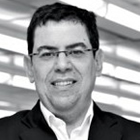 |
| KEYNOTE |
|
 |
| . |
|
|
Antonio H. Castro Neto
NUS, Singapore
Keynote – Plenary Session
Professor A. H. Castro Neto got his Ph.D. in Physics at University of Illinois at Urbana Champaign in 1994. In 1994, he moved to the Institute for Theoretical Physics at the University of California at Santa Barbara as a postdoctoral fellow. In 1995, he became an Assistant Professor at University of California at Riverside. In 2000, he moved to Boston University as Professor of Physics. At Boston, Prof. Castro Neto became one of the leading theorists in the study of graphene. In 2010, Prof. Castro Neto became the Director of the Graphene Research Center and Distinguished Professor at the National University of Singapore . In 2003, Prof. Castro Neto was elected a fellow of the American Physical Society. He is the colloquia Editor for Reviews of Modern Physics, and co-editor for Europhysics Letters. Prof. Castro Neto was awarded the 11th Ross J. Martin Award by the University of Illinois at Urbana-Champaign, the University of California Regent Fellowship, the Alfred P. Sloan Research Fellowship, the visiting Miller Professorship by the University of California, Berkeley, the visiting Gordon Godfrey Professorship by the University of New South Wales, Australia, and the Distinguished Visiting Chair Professor at the SKKU Advanced Institute of Nano-Technology (SAINT), South Korea. Prof. Castro Neto has authored more than 200 manuscripts and has published in prestigious journals including Science, Nature Materials, Nature Physics, and Physical Review Letters, and has over 12,000 citations. Prof. Castro Neto has given more than 200 seminars worldwide.
|
|
|
|
|
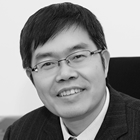 |
| KEYNOTE |
|
 |
| . |
|
|
Hui-Ming Cheng
Chinese Academy of Sciences, China
Keynote – Plenary Session
Cheng Huiming was born in Sichuan in 1963. He received his bachelor degree in 1984 on carbon materials from Hunan Univ., his M.S. in 1987 and Ph.D in 1992 on materials sci. and eng. from the Institute of Metal Research, Chinese Academy of Sciences (IMR CAS). Prof. Cheng began his career as a Guest Researcher at Kyushu Industrial Research Institute, Agency of Industrial Science and Technology, Japan, in 1990; then he was employed as a Research Associate in the Dept. of Materials Sci. and Eng., Faculty of Eng. at Nagasaki Univ., Japan, in 1992, and then took an associate professor position at IMR CAS in 1993. He is currently professor and deputy director at the same institute. Prof. Cheng also worked at MIT (USA), Nanyang Technological Univ. (Singapore), Univ. of Queensland (Australia), etc, as visiting scientist or honorary professor for short periods.
Prof. Cheng is mainly working on carbon nanotubes (CNTs) and graphene, new energy materials and high-performance carbon materials. He authored or co-authored more than 300 peer-reviewed papers which have been cited for more than 8000 times. For his scientific achievements, he was awarded a number of national and international prizes, such as the 2nd class National Award in Natural Science, Ryukiti Hashiguti Award, Khwarizmi Award, Chareles E. Pettinos Award, etc. Prof. Cheng has already supervised more than 30 Ph.D students, given more than 40 invited talks on international and national conferences and symposia, and is Editor of Carbon since 2000 and Editor in Chief of New Carbon Materials since 1998. He takes a leading role in carbon materials research in China.
|
|
|
|
|
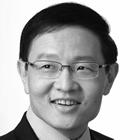 |
| WORKSHOP 2 |
|
 |
| . |
|
|
Lim Chwee Teck
National Univ. of Singapore, Singapore
Invited – Workshop 2: Biosensors and Medical Applications
Professor Lim is a Provost’s Chair Professor at the Department of Biomedical Engineering, a Principal Investigator at the Mechanobiology Institute as well as a Faculty Fellow of the Singapore-MIT Alliance for Research & Technology. He is founding member of the Department of Biomedical Engineering , the university’s Nanoscience and Nanotechnology Initiative as well as the university’s Centre for Advanced 2D Materials. Prof Lim’s research interest are interdisciplinary and they include the mechanobiology of human diseases such as malaria and cancer, development of microfluidic technologies for disease detection, diagnosis and therapy and 2D materials for biomedical applications.
He has authored more than 280 peer-reviewed papers (including 38 invited/review articles), 26 book chapters and delivered more than 270 invited talks. He is an elected Fellow of the American Institute for Medical and Biological Engineering as well as the Academy of Engineering, Singapore. He is also an elected member of the World Council of Biomechanics. He currently sits on the editorial boards of more than 12 international journals. Prof Lim has co-founded one incubator and four startups which are commercializing technologies developed in his lab.
He and his team have garnered more than 50 research awards and honors including the Vladimir K. Zworykin Award in 2015, University’s Outstanding Researcher Award and Outstanding Innovator Award in 2014, the Credit Suisse Technopreneur of the Year Award, Wall Street Journal Asian Innovation Award (Gold) in 2012, President’s Technology Award in 2011 and the IES Prestigious Engineering Achievement Award in 2010 among others. His research was cited by the MIT Technology Review magazine as one of the top ten emerging technologies of 2006 that will “have a significant impact on business, medicine or culture”.
|
|
|
|
|
 |
| INDUSTRIAL FORUM |
|
 |
| . |
|
|
Camilla Coletti
Istituto Italiano di Tecnologia, Italy
Industrial Forum
Camilla Coletti received her MS degree in electrical engineering from the University of Perugia (Italy) in 2004 and her PhD degree in electrical engineering from the University of South Florida (USA) in 2007. From 2008 to 2011 she was first a Max Planck postdoctoral fellow and then an Alexander von Humboldt postdoctoral fellow at the Max Planck Institute for Solid State Research of Stuttgart (Germany). During her research career she has accumulated a broad range of experimental experience in different fields such as chemical vapor deposition (CVD) growth, semiconductor/cells hybrid systems, and surface science. She is particularly expert on the CVD synthesis and characterization of carbon based materials, especially graphene. She is a skilled user of several spectroscopic and microscopic characterization techniques and has extensive experience at synchrotron facilities. She is active part of the graphene scientific community since 2008. Her contributions to the field include – for example – the development of the hydrogen intercalation technique, which is used to decouple graphene from the underlying SiC substrate, and the realization of transfer doping via molecular adlayers.
Since April 2016 Camilla Coletti is the Principal Investigator of the research line 2D Materials Engineering (TT1 Researcher) at the Center for Nanotechnology Innovation @ NEST in Pisa. She is the IIT responsible for the work-package Enabling Materials (WP3) of the European Flagship Project.
She is author of about 50 peer-reviewed publications, holds 2 international patent, authored 4 book chapters, and gave more than 30 invited/keynote talks.
|
|
|
|
|
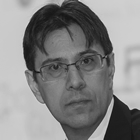 |
| INDUSTRIAL FORUM |
|
 |
| . |
|
|
Antonio Correia
Phantoms Foundation, Spain
Industrial Forum
|
|
|
|
|
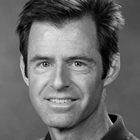 |
| WORKSHOP 6 |
|
 |
| . |
|
|
Scott A. Crooker
Los Alamos National Laboratory, USA
Invited – Workshop 6: Spintronics & Valleytronics
Technical Staff Member
National High Magnetic Field Laboratory
Educational Background:
1997, Ph.D., Physics, University of California, Santa Barbara
1992, B.A., Physics, Cornell University
Professional Experience:
2000-2008, Technical Staff Member, National High Magnetic Field Laboratory, Los Alamos
1998-2000, Postdoctoral Research Fellow, Los Alamos National Laboratory
Awards, Honors, and Service:
Fellow, Optical Society of America (2013)
American Physical Society Fellow (2010)
Los Alamos National Laboratory Fellows' Prize for Outstanding Research (2007)
LANL Outstanding Innovation Technology Transfer Award (2007)
Los Alamos Director’s Postdoctoral Fellowship (1998)
|
|
|
|
|
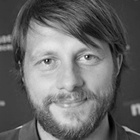 |
| WORKSHOP 3 |
|
 |
| . |
|
|
Alexander Croy
Technische Universität Dresden, Germany
Invited – Workshop 3: Theory & Simulation
Alexander studied physics at TU Chemnitz (Germany) and at the University of Warwick (UK), where he also got his MSc (by Research). For his PhD he joined the Max Planck Institute for the Physics of Complex Systems (MPIPKS) in Dresden. There, he worked with Prof. Ulf Saalmann on time-dependent nano electronics. After defending his thesis and being postdoc at MPIPKS and TU Chemnitz, Alexander joined the Condensed Matter Theory group at Chalmers University of Technology (Sweden). Working with Prof. J. Kinaret and Prof. A. Isacsson the focus of his research shifted to (carbon-based) nanoelectromechanical systems. In 2014 he became Distinguished PKS Postdoctoral Fellow at the MPIPKS. In July 2016 he joined the chair of Prof. Cuniberti and plans to work on computational nanomechanics.
|
|
|
|
|
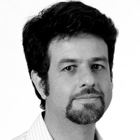 |
| INVITED |
|
 |
| . |
|
|
Christiano J. S. de Matos
Mackenzie Presbyterian University, Brazil
Invited – Plenary Session
Christiano got his BSc and his MSc in Physics from Pontifícia Universidade Católica do Rio de Janeiro (PUC-Rio) in 1997 and 1999, respectively, and his PhD from Imperial College London in 2004. He has worked in the areas of Physics and Electric Engineering, focusing in the fields of Optics and Photonics and acting on the following subjects: nanophotonics, 2D materials, optical fibers, microstructured fibers, photonic crystal fibers, and nonlinear optics.
|
|
|
|
|
 |
| WORKSHOP 3 |
|
 |
| . |
|
|
Cristiane de Morais Smith
University of Utrecht, The Netherlands
Invited – Workshop 3: Theory & Simulation
C. Morais Smith works on condensed matter physics, more specifically on strongly correlated systems. Her research spans a large variety of lowdimensional quantum systems, ranging from high-temperature superconductors to quantum Hall systems, graphene, and carbon nanotubes.
More recently, she became interested also in cold atoms physics. When loaded into optical lattices, ultracold quantum gases allow us to emulate condensed matter systems. The research done in her group involves mostly analytical techniques, such as field theory, renormalization group, Chern-Simons theory, bosonization, etc. The emphasis of her research resides in the connections between different physical systems, and how the knowledge of one system can be used to help the understanding of a more complex one.
|
|
|
|
|
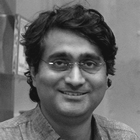 |
| WORKSHOP 5 |
|
 |
| . |
|
|
Mandar Deshmukh
Tata Institute of Fundamental Research, India
Invited – Workshop 5: Mechanical properties and Nanomechanics
Mandar Madhukar Deshmukh (born 20 October 1974) is an Indian physicist specialising in nanoscale and mesoscopic physics and affiliated to Tata Institute of Fundamental Research, Mumbai. He was awarded the Shanti Swarup Bhatnagar Prize for Science and Technology in 2015, the highest science award in India, in the physical sciences category.[1] He obtained BTech degree from Indian Institute of Technology Bombay in 1996 and PhD degree from Cornell University under the guidance of D.C. Ralph in 2002.
|
|
|
|
|
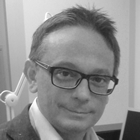 |
| WORKSHOP 4 |
|
 |
| . |
|
|
Aldo Di Carlo
University of Rome "Tor Vergata", Italy
Invited – Workshop 4: Energy
Aldo Di Carlo is Full Professor of Optoelectronics and Nanoelectronics at the University of Rome "Tor Vergata", Department of Electronics Engineering. Leader of the Nano&Optoelectronic research group - http://www.optolab.uniroma.it at the Department of Electronic Engineering and member of the IEEE Electron Devices Society. His research activity concerns the study of electronic and optical properties of nanostructured devices, their analysis, optimization and technology. The development of the non-equilibrium theory for the microscopic description of the transport process in organic/inorganic devices and thermal processes at nanoscale has been the subject of invited talks at international conferences and University seminars. In the last years his researches have focussed on the study and fabrication of organic devices. Research activities in carbon nanotubes have been quite successful leading to the realization cold cathode vacuum triode based on CNT cathode for THz generation. The research activity of organic optoelectronic devices has been consider of excellence and the Lazio Region has sponsored this activity funding the "Polo Solare Organico della Regione Lazio", namely the Center for Hybrid and Organic Solar Energy (CHOSE) where Prof. A. Di Carlo is co-director. The aim of the Center is the study and development of organic photovoltaic cells and their industrialization. Prof. Di Carlo has organized, together with Prof. Lugli, IEEE 2004 Nanotechnology Conference in Munich. Prof. Di Carlo is author/co-author of more than 300 scientific publications in international journals, several reviews on electronic and optoelectronic devices, 7 patents, several book chapters and co-author of two books (in Italian language) and has been invited to more than 40 invited talk at international conferences. Prof. Di Carlo has an h-factor = 38. The results of his research have been used to realize 5 spin-off companies dealing with ICT and Energy technologies.
|
|
|
|
|
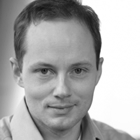 |
| INVITED |
|
 |
| . |
|
|
Dirk Englund
MIT, USA
Invited – Plenary Session
Dirk Englund received his BS in Physics from Caltech in 2002. Following a year at TU Eindhoven as a Fulbright Fellow, he did his graduate studies at Stanford, earning his MS in electrical engineering and PhD in Applied Physics in 2008. He was a postdoctoral fellow at Harvard University until 2010, when he started his group as Assistant Professor of Electrical Engineering and of Applied Physics at Columbia University. He moved to MIT in 2013 as Assistant Professor of Electrical Engineering and Computer Science and a member of RLE and MTL. Dirk's research focuses on quantum technologies based on semiconductor and optical systems. Recent recognitions include the 2012 DARPA Young Faculty Award, the 2012 IBM Faculty Award, the 2011 Presidential Early Career Award for Scientists and Engineers, the 2011 Sloan Research Fellowship in Physics, and the 2012 IEEE-HKN Outstanding Young Professional Award.
|
|
|
|
|
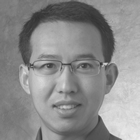 |
| WORKSHOP 5 |
|
 |
| . |
|
|
Philip Feng
Case Western Reserve University, USA
Invited – Workshop 5: Mechanical properties and Nanomechanics
Philip Feng is an Assistant Professor in EECS at Case School of Engineering, Case Western Reserve University. His research is primarily focused on nanoscale and emerging devices and integrated systems. Prior to joining Case, Feng was at the Kavli Nanoscience Institute, California Institute of Technology (Caltech), where he served as a Staff Scientist and a Co-Principal Investigator from 2007 to 2010. He received his Ph.D. from Caltech in 2007. His recent awards include an NSF CAREER Award, 3 Best Paper Awards (with his advisees, out of 8 nominated Best Paper Finalists), a Glennan Fellowship, and an Innovative Incentive Award. Feng was one of the 81 young engineers selected to participate in the National Academy of Engineering (NAE)’s 2013 U.S. Frontier of Engineering (USFOE) Symposium. Subsequently, he received the NAE’s Grainger Foundation Frontiers of Engineering Award in 2014. He also received the Case School of Engineering Graduate Teaching Award (2014), and the Case School of Engineering Research Award (2015). He has over 90 peer-reviewed papers and 5 issued patents; and his papers have over 2600 citations in recent years. He is a senior member of IEEE, a member of AVS, APS, and MRS.
|
|
|
|
|
 |
| INDUSTRIAL FORUM |
|
 |
| . |
|
|
Andrea Ferrari
Cambridge Graphene Centre, University of Cambridge, UK
Industrial Forum
Andrea C. Ferrari earned a PhD in electrical engineering from Cambridge University, after a Laurea in nuclear engineering from Politecnico di Milano, Italy. He is Professor of Nanotechnology and the Director of the Cambridge Graphene Centre and of the EPSRC Centre for Doctoral Training in Graphene Technology. He is Fellow of Pembroke College, the American Physical Society, the Institute of Physics and the Materials Research Society. His research interests include nanomaterials growth, modelling, characterization, and devices. He was awarded the Royal Society Brian Mercer Award for Innovation, the Marie Curie Excellence Award, the Philip Leverhulme Prize, The EU-40 Materials Prize, The Royal Society Wolfson Research Merit Award. He is also the Chairman of the Executive Board of the EU Graphene Flagship.
|
|
|
|
|
 |
| INVITED |
|
 |
| . |
|
|
Costas Galiotis
FORTH/ ICE-HT and University of Patras, Greece
Invited – Plenary Session
Costas Galiotis is the Principal Investigator (PI) of the ERC Advanced – Tailoring Graphene project. He is a Professor at the Department of Chemical Engineering (Univ. of Patras) and former Director of the Institute of Chemical Engineering Sciences (ICE-HT) which is one of the 7 academic research institutions of the Foundation of Research and Technology-Hellas (FORTH).
In its over 26 years of operation FORTH/ ICE-HT has developed into a world-leading centre for the advancement of high quality scientific knowledge in the fields of material science and in the computer aided design and simulation of new materials and processes. It comprises of approximately 150 personnel and has a running yearly budget of 5 M€. Prof. Galiotis is also a member of the Board of Directors of FORTH (since July 2007). FORTH has been ranked as the first Research Centre in the field domain in Greece in 3 successive evaluations.
Prof. Galiotis had an auspicious term of office as Director of the Institute in the years 2009-2014. Being also the coordinator of the Hellenic participation and national representative of “Graphene” he contributed in establishing the Graphene Center by joining the research forces of three FORTH institutes, ICE-HT, IESL and ICAM. Despite the Country's intense economic situation he expanded the Institute by literally setting the foundations to the Institute's new modern building that will house research laboratories.
|
|
|
|
|
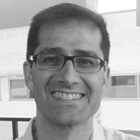 |
| WORKSHOP 2 |
|
 |
| . |
|
|
Jose A. Garrido
ICREA/ICN2, Spain
Invited – Workshop 2: Biosensors and Medical Applications
Jose Antonio Garrido is an ICREA Research Professor working at Catalan Institute of Nanoscience and Nanotechnology (ICN2) in Barcelona, and head of the Advanced Electronic Materials and Devices group, which explores novel electronic materials, such as graphene and other 2D materials, and their potential in electronic and bioelectronic applications.
He received a master and PhD degree in Telecommunication Engineering from the Technical University of Madrid, in 1996 and 2000, respectively. From 2001 to 2004, he worked as a postdoc at the Walter Schottky Institute, Technische Universität München, and afterwards became Group Leader of the Functional Carbon Materials group. He obtained his habilitation in experimental physics at the TU Munich in 2010. From 2011 to 2015, Jose A. Garrido held a lecturer (privatdozent) position at the department of physics of the Technische Universität München. Jose A. Garrido is Editor of the journal Diamond and Related Materials and co-coordinator of the workpackage Biomedical technologies of the European Graphene Flagship Initiative.
|
|
|
|
|
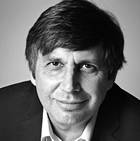 |
| PLENARY |
|
 |
| . |
|
|
Andre Geim
University of Manchester, UK
Plenary Talk
Sir Andre Geim is the Regius Professor and Royal Society Research Professor at The University of Manchester. He has received many international awards and distinctions, including the John Carty Prize from the US National Academy of Sciences and the Copley Medal from the Royal Society. Most notably, he was awarded the 2010 Nobel Prize in Physics for his groundbreaking work on graphene.
Andre Geim was born in Russia in 1958 to German parents and holds dual British and Dutch citizenship. He started his academic career in Moscow, spent several years as a postdoctoral researcher at the universities of Nottingham, Bath and Copenhagen and then moved to the Netherlands as associate professor before coming to Manchester in 2001.
During his career, Andre Geim has published many research papers, of which more than 15 are cited over 1,000 times and two cited over 10,000 times. The latter two are now in the list of 100 most cited research papers in human history. Thomson-Reuters repeatedly named him among the world’s most active scientists and attribute to him the initiation of three new research fronts – diamagnetic levitation, gecko tape and graphene.
Andre was also awarded the IgNobel prize in 2000 for his work on levitating frogs, becoming the only recipient of both Nobel and IgNobel Prizes. He has also received both Dutch and British knighthoods. He is married to a fellow physicist and long-term collaborator and has a daughter.
|
|
|
|
|
 |
| INDUSTRIAL FORUM |
|
 |
| . |
|
|
Khasha Ghaffarzadeh
IDTechEx, UK
Industrial Forum
Dr Khasha Ghaffarzadeh is the Research Director at IDTechEx. He has helped deliver over 50 consulting projects for our clients across the world. The projects have covered custom market research, technology scouting, partnership/customer development, technology roadmapping, product positioning, competitive analysis and investment due diligence.
The projects have focused on a variety of emerging technologies such as energy storage, advanced materials, functional inks and coatings, novel display technologies, 3D printing, photovoltaics, printed electronics, electronic textiles, sensors, actuators, etc
|
|
|
|
|
 |
| INDUSTRIAL FORUM |
|
 |
| . |
|
|
Jos Giesbers
Philips Innovation Services, The Netherlands
Industrial Forum
Jos Giesbers finished his PdD in 2010 at the High Field Magnet Laboratory of the Radboud University Nijmegen. During his PhD he investigated the electrical properties of two dimensional electron systems in high magnetic fields. Following two post doc positions in the area of graphene at the Max Planck Institute in Stuttgart and the Technical University Eindhoven, he started working at Philips Research in 2013 as contingency worker for TMC, where he worked on a variety of topics from graphene to (O)LEDs. Since 2015 he works at the Philips Innovation Services MEMs foundry and specializes in thin film membranes, graphene, III/V materials and MEMs.
|
|
|
|
|
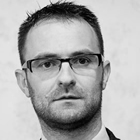 |
| INDUSTRIAL FORUM |
|
 |
| . |
|
|
Julio Gomez
Avanzare, Spain
Industrial Forum
Julio Gomez is the Founder of AVANZARE, company producer of graphene and other 2D materials and its composites . He is primarily interested in the mechanical properties of atomically thin materials such as graphene. He received his B.S. degree in Chemistry from Universidad Complutense de Madrid (1995), receiving the and a Ph.D. in Chemistry (2000) from University of La Rioja where he studied the preparation and electrical and optical properties of nanosize metallic clusters, and a postdoctoral researcher position in the Laboratoire de Synthèse Organique, University of Nantes-CNRS After finishing his Ph.D, he spent 3 years as assistant Professor in Universidad de La Rioja and 2 years as an Area Manager in the research centre CIDETEC studying electrochemical systems before joining AVANZARE at the end of 2004. His awards include among others the best B.S. degree in Chemistry in 1995 award in the University Complutense de Madrid, the best PhD degree in Science and Technology award in the University of La Rioja from the years 1999-2000, National award Entrepreneur of the year 2008 in Spain, best product NANOAWARDS 2008 (USA), F&S best practices in innovation 2013 (UK). Author of 47 papers H-index 22.
|
|
|
|
|
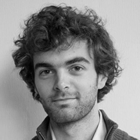 |
| INVITED |
|
 |
| . |
|
|
Stijn Goossens
ICFO - The Institute of Photonic Sciences, Spain
Invited – Plenary Session
During my PhD research I faced the challenge of isolating a single electron in graphene, a single sheet of carbon atoms. With this single electron we were working towards realising the basic building block of a quantum computer, a quantum bit. Working in a large international research group forced me to maintain a broad view and highly motivates me because of the interaction with people with a very different background. Recently I moved to Barcelona to start a new job as prototype developer. The stimulating scientific environment is still present. The aim of my work has changed dramatically. The goal of my current project is to take graphene optoelectronic devices from the lab to the consumer market. It is very exciting to contribute to the introduction of graphene to everyday life.
Specialties: Project managment, working in teams, observation, cleanroom fabrication, data analysis and visualization
|
|
|
|
|
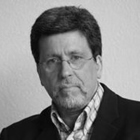 |
| INDUSTRIAL FORUM |
|
 |
| . |
|
|
Paul Hedges
Applied Nanolayers B.V., The Netherlands
Industrial Forum
CEO and Co-founder at Applied Nanolayers.
|
|
|
|
|
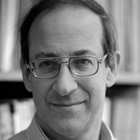 |
| PLENARY |
|
 |
| . |
|
|
Tony F. Heinz
Stanford University, USA
Plenary Talk
Tony Heinz is a Professor of Applied Physics and Photon Science at Stanford University and the Director of the Chemical Sciences Division at the SLAC National Accelerator Laboratory. Heinz received a BS degree in Physics from Stanford University and a PhD degree, also in Physics, from the University of California at Berkeley in 1982. Heinz was subsequently at the IBM Research Division in Yorktown Heights, NY until he joined Columbia University in 1995 as a Professor of Electrical Engineering and Physics. At Columbia, he served as the Chair of the Department of Electrical Engineering from 2003 until 2007. He has also served as a Scientific Director of the Columbia Nanoscale Science and Engineering Center (NSEC) and of the Energy Frontier Research Center (EFRC). He was the President of the Optical Society of America in 2012. Heinz joined Stanford University in 2015.
Heinz's research has centered on the elucidation of the properties and dynamics of nanoscale materials through the application of a wide range of optical spectroscopies. His research on surfaces, interfaces, and nanoscale materials, such as carbon nanotubes, graphene and other 2D materials, has been recognized by Optics Prize of the International Commission for Optics, a Research Award of the von Humboldt Foundation, the Julius Springer Prize for Applied Physics, and the Isakson Prize of the American Physical Society.
|
|
|
|
|
 |
| INVITED |
|
 |
| . |
|
|
Eric J. Heller
Harvard University, USA
Invited – Plenary Session
Eric J. "Rick" Heller (born January 10, 1946) is the Abbott and James Lawrence Professor of Chemistry and Professor of Physics at Harvard University. Heller is known for his work on time dependent quantum mechanics, and also for producing digital art based on the results of his numerical calculations.
Heller is principally known for pioneering a time-dependent wavepacket picture of quantum mechanics, which allowed the excited-state dynamics of large quantum mechanical systems to be understood without calculating eigenstates. Heller's work laid the foundations for a theoretical understanding of femtochemistry. Heller has also made seminal contributions to methodology, suggesting the technique called "frozen Gaussians"—today the most widely used semiclassical initial value representation (IVR) method of wavepacket propagation.
In physics, Heller is known for his work on quantum chaos, particularly on scar theory. Heller's more recent work has focused on the study of two dimensional electron gases, quantum mirages in quantum corrals, scattering theory, few-body quantum mechanics, semiclassical methods, and freak waves in the ocean. Many (though not all) of these studies make use of the time-dependent quantum mechanics ideas from his earlier work.
Heller is an elected member of the International Academy of Quantum Molecular Science, the National Academy of Sciences, the American Academy of Arts and Sciences, and the American Association for the Advancement of Science, and the American Philosophical Society. Heller has received the American Chemical Society Award in Theoretical Chemistry (2005), the Astor Fellowship at Oxford (2005) and the Joseph O. Hirschfelder Prize (2003). Heller has been a Sloan Fellow, a Humboldt Fellow, a fellow of the American Physical Society, and a Guggenheim Fellow, and is the coauthor of over 260 publications.
|
|
|
|
|
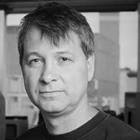 |
| INVITED |
|
 |
| . |
|
|
James Hone
Columbia University, USA
Invited – Plenary Session
The Hone group creates and studies nano-materials and nano-structures for a wide range of applications and areas of basic science. We work extensively with atomically thin two-dimensional (2D) materials, such as graphene, with interest in synthesis, mechanical properties, and electronics. In particular, we have developed techniques to ‘stack’ 2D materials into novel ‘van der Waals heterostructures’. We use these techniques to study 2D materials in the clean limit and to achieve new properties and functionality. We also use 2D materials for opto-electronic applications, novel nano-electromechanical devices, and flexible electronics. We also have a significant effort in nano-biology, where we create tools to measure forces exerted by single cells and seek to understand how cells use these forces to test the mechanical properties of substrates.
|
|
|
|
|
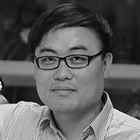 |
| INVITED |
|
 |
| . |
|
|
Byung-Hee Hong
Seoul National Univ. & Graphene Square, South Korea
Invited – Plenary Session
Byung Hee Hong received B.S. (1998), M.S. (2000) and Ph.D. (2002) degrees in chemistry from POSTECH. After spending 3.5 years as a post-doc at Columbia University (Advisor: Philip Kim), he joined the Department of Chemistry, Sungkyunkwan University as an assistant professor in 2007. Now he is an associate professor in the Department of Chemistry at Seoul National University. Prof. Hong pioneered the synthesis of large-scale graphene by chemical vapor deposition (CVD), which triggered chemical researches toward the practical applications of graphene. His first report on CVD synthesis of graphene (Nature 457, 706 (2009)) has recorded the world No. 1 citations in chemistry among the papers published since 2009. A year after, Prof. Hong developed the synthesis of ultra-large graphene based on roll-to-roll methods and its application to flexible touch screens (Nature Nanotech. 5, 574-578 (2010)), which is believed to be the first demonstration of graphene materials utilized for practical electronic devices. Prof. Hong was invited to give a presentation on the large-scale synthesis and practical applications of graphene in Nobel Symposium in 2010. He received POSCO TJ Park Science Fellowship (2009), SKKU Young Fellowship (2010), Yumin Award of Science (2010), Kyung-Ahm Prize of Natural Sciences (2011), Excellent Researcher Award in Materials Chemistry (Korean Chemical Society, 2012), and Creative Knowledge Award (Korean Government, 2012).
|
|
|
|
|
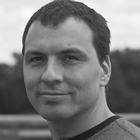 |
| INDUSTRIAL FORUM |
|
 |
| . |
|
|
Cedric Huyghebaert
IMEC, Belgium
Industrial Forum
Cedric Huyghebaert is currently leading the nano-applications and material engineering team at imec dealing with the integration of nano materials as CNT, nanowires,graphene and MoS2 in functional applications, in the field of beyond Si scaling, advanced interconnect and energy storage applications. He started as a junior researcher in the materials and component analyses group at imec. He studied the oxygen bean interactions during sputtering profiling of semiconductors. He received his PhD in Physics in 2006 at the KULeuven in Belgium. In 2005 he joined imecs pilot line management team, especially dealing with integration challenges and the process contamination control. In 2008 he joined the 3D integration team to organize the migration of the 3D technology from a lab environment to the a pilot line. He was the lead integration engineer of the first demonstration of 3D TSV interconnects by wafer to wafer bonding.
|
|
|
|
|
 |
| INVITED |
|
 |
| . |
|
|
Pablo Jarillo-Herrero
MIT, USA
Invited – Plenary Session
Professor Jarillo-Herrero's research interests lie in the area of experimental condensed matter physics, in particular quantum electronic transport and optoelectronics in novel low dimensional materials, such as graphene and topological insulators (TIs).
Pablo Jarillo-Herrero joined MIT as an assistant professor of physics in January 2008. He received his M.Sc. in physics from the University of Valencia, Spain, in 1999. Then he spent two years at the University of California in San Diego, where he received a second M.Sc. degree before going to the Delft University of Technology in The Netherlands, where he earned his Ph.D. in 2005. After a one-year postdoc in Delft, he moved to Columbia University, where he worked as a NanoResearch Initiative Fellow. His awards include the Spanish Royal Society Young Investigator Award (2007), an NSF Career Award (2008), an Alfred P. Sloan Fellowship (2009), a David and Lucile Packard Fellowship (2009), the IUPAP Young Scientist Prize in Semiconductor Physics (2010), a DOE Early Career Award (2011), a Presidential Early Career Award for Scientists and Engineers (PECASE, 2012), and an ONR Young Investigator Award (2013).
|
|
|
|
|
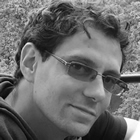 |
| WORKSHOP 1 |
|
 |
| . |
|
|
Ido Kaminer
Technion – Israel Institute of Technology, Israel
Invited – Workshop 1: Optoelectronics and Nanophotonics
Ido Kaminer is a Graduate of the Technion Excellence Program, receiving his Bachelor in both Electrical Engineering and Physics. He was granted the Knesset (Israeli Parliament) Award for outstanding undergraduate student achievements in 2007. He has completed his PhD degree in the Physics Department. In his dissertation, he discovered new classes of accelerating beams in nonlinear optics and electromagnetism, for which he received the 2012 Israel Physical Society Prize and the 2014 APS Award for Outstanding Doctoral Dissertation in Laser Science.
|
|
|
|
|
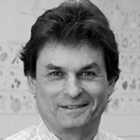 |
| KEYNOTE |
|
 |
| . |
|
|
Richard Kaner
University of California, USA
Keynote – Plenary Session
Richard B. Kaner received his Ph.D. in inorganic chemistry from the University of Pennsylvania in 1984. After carrying out postdoctoral research at the University of California, Berkeley, he joined the University of California, Los Angeles (UCLA), in 1987 as an Assistant Professor. He was promoted to Associate Professor with tenure in 1991 and became a Full Professor in 1993. Professor Kaner has received awards from the Dreyfus, Fulbright, Guggenheim, and Sloan Foundations, as well as the Exxon Fellowship in Solid State Chemistry and the Buck-Whitney Research Award from the American Chemical Society for his work on refractory materials, including new synthetic routes to ceramics, intercalation compounds, superhard materials, graphene, and conducting polymers.
Professor Kaner holds a joint appointment in the Department of Chemistry & Biochemistry as well as in the Department of Materials Science & Engineering.
|
|
|
|
|
 |
| WORKSHOP 3 |
|
 |
| . |
|
|
Mikhail Katsnelson
Radboud University, The Netherlands
Invited – Workshop 3: Theory & Simulation
Prof. M.I. (Mikhail) Katsnelson (1957) is professor of Theoretical Physics at Radboud University Nijmegen. Katsnelson is one of the founding fathers of research into graphene, a single layer of carbon atoms arranged in a honeycomb lattice. This two-dimensional structure gives the material unique characteristics. It is the thinnest and toughest material ever produced and conducts electricity thirty times faster than silicon. Graphene can potentially be used in solar cells, high frequency transistors and as a replacement for silicon computerchips.
Katsnelson is the world's best-cited and most influential theoretician in the area of graphene. His various publications about this subject have already been cited more than 12,000 times. André Geim, who received the Nobel Prize in Physics in 2010 for the discovery of graphene, says that without Katsnelson their 'rapid progress would be impossible'. Katsnelson's research lies at the basis of almost all discoveries and predictions about graphene. For example, he predicted Klein tunnelling in graphene and the rippling of graphene at finite temperatures and that the electrical properties of graphene would change if it were stretched.
Katsnelson's broad research profile makes him unique: within solid-state physics he plays a leading role in research into lattice dynamics, magnetism, electron structure and spectroscopy. He brings together researchers and research from different disciplines and by doing this strengthens the discipline of theoretical physics. In Nijmegen, he leads a superb research group. As a theoretician, Katsnelson frequently works together with experimental physicists to test his predictions and theories.
|
|
|
|
|
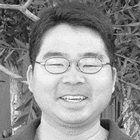 |
| WORKSHOP 6 |
|
 |
| . |
|
|
Roland K. Kawakami
The Ohio State University, USA
Invited – Workshop 6: Spintronics & Valleytronics
I’ve been fascinated by spin and magnetism beginning with my early studies on ferromagnetic metal and semiconductor heterostructures grown by MBE. The advent of 2D materials opens up great new possibilities for spintronics, valleytronics, and novel magnetic and topological phenomena. Our team has worked hard to develop a unique laboratory with advanced MBE, device, optics, and spin-polarized STM capabilities to create materials and devices with atomic-scale precision and to explore their properties by transport and microscopies with high spatial and temporal resolution. Some aspects of this work are connected to future computers and electronics that operate faster while using less energy. I am particularly happy to be training a diverse group of students and providing opportunities for personal empowerment. Beyond science, I enjoy cycling, Hamilton and following the basketball career of Jeremy Lin.
|
|
|
|
|
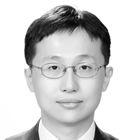 |
| WORKSHOP 2 |
|
 |
| . |
|
|
Dae-Hyeong Kim
SNU, South Korea
Invited – Workshop 2: Biosensors and Medical Applications
Associate Professor in School of Chemical and Biological Engineering at Seoul National University.
|
|
|
|
|
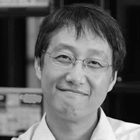 |
| PLENARY |
|
 |
| . |
|
|
Philip Kim
Harvard University, USA
Plenary Talk
Professor Philip Kim was born in Seoul, Korea in 1967. He received his B.S in physics at Seoul National University in 1990 and received his Ph. D. in Applied Physics from Harvard University in 1999. He was Miller Postdoctoral Fellow in Physics from University of California, Berkeley during 1999-2001. In 2002, he joined in Department of Physics at Columbia University as a faculty member, where he is now Professor of Physics. Starting from summer of 2014, he moves to Harvard as Professor of Physics.
Professor Kim is a world leading scientist in the area of materials research. His research area is experimental condensed matter physics with an emphasis on physical properties and applications of nanoscale low-dimensional materials. The focus of Prof. Kim’s group research is the mesoscopic investigation of transport phenomena, particularly, electric, thermal and thermoelectrical properties of low dimensional nanoscale materials. These materials include carbon nanotubes, organic and inorganic nanowires, 2-dimensional mesoscopic single crystals, and single organic molecules. The use of modern state-of-the-art semiconductor device fabrication techniques and the development of new methods of material synthesis/manipulation are essential parts of this research. He has initiated these efforts very successfully, and is continuously making innovations in microscopic experimental tools and methods in order to investigate the electric, thermal/thermoelectric transport properties of the nanoscale materials.
Professor Kim published more than 120 papers in professional journals which are well cited. Many of his papers are published in high impact journals such as Nature, Science and Physical Review Letters. Professor Kim received numerous honors and award including Oliver E. Buckley Prize (2014), Loeb Lectureship, Harvard (2012); Dresden Barkhausen Award (2011); Yunker Lectureship, Oregon State University, (2011); Chapman Lectureship, Rice University, (2009); IBM Faculty Award (2009); Ho-Am Science Prize (2008); American Physical Society Fellow (2007); Columbia University Distinguished Faculty Award (2007); Recipient Scientific American 50 (2006); National Science Foundation Faculty Career Award (2004). In addition, He has given more than 300 invited presentations as keynote speaker, plenary speakers, and invited speakers in international and domestic conferences, colloquiums and department seminars.
|
|
|
|
|
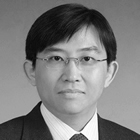 |
| INVITED |
|
 |
| . |
|
|
Sang Ouk Kim
Korea Advanced Institute of Science and Technology (KAIST), South Korea
Invited – Plenary Session
Kim is known for his pioneering work in manipulating the properties (work function, conductivity, surface energy, chemo-responsiveness, etc.) of carbon-based materials using double-element doping. Through his research, Kim showed that carbon materials could be extremely useful in various areas including solar batteries and flexible devices. His work has been recognized and published in such journals as Advanced Materials, which invited him to write a review paper on his research in its 25th anniversary issue in 2014, along with world-renowned scholars including the Nobel laureate Alan Heeger. Kim has published a total of 143 Science Citation Index papers in journals like Nature, Science, Nature Materials, Nature Communications, Advanced Materials, Nano Letters and Physical Review Letters. According to Scopus, a bibliographic database containing abstracts and citations for academic journal articles, he has been cited 6,456 times and has a h-index of 44, an index describing the scientific productivity and impact of a researcher.
|
|
|
|
|
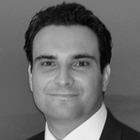 |
| WORKSHOP 4 |
|
 |
| . |
|
|
Emmanuel Kymakis
TEI of Crete, Greece
Invited – Workshop 4: Energy
Emmanuel Kymakis is Full Professor at the Electrical Engineering Department of the Technological Educational Institute (T.E.I) of Crete, where he heads the Nanomaterials and Advanced Electronics group of the Center of Advanced Materials & Photonics. He received the B.Eng. (First Class Honors) degree in Electrical Engineering & Electronics from Liverpool University in 1999 and the Ph.D. degree in Electrical Engineering from Cambridge University in 2003. He and Prof. Gehan Amaratunga are the inventors of the polymer-nanotube solar cell. Before joining TEI of Crete, he was a technical consultant offering engineering and consultancy services in the field of photovoltaic and solar thermal power plants for various Greek and international investors and private companies. His technological interests are in the synthesis and solution processing of novel carbon nanomaterials and their incorporation into organic electronic devices. His research topics presently include investigation of the opto-electronic properties of graphene, carbon nanotubes, layered crystals and inorganic-organic hybrids for the development of low cost next generation flexible photovoltaic devices, compatible with roll-to-roll large area manufacturing methods. He has over 80 SCI publications with over 4.500 citations (h-index=33) on these topics and has given 38 invited lectures. He has been selected as an honorary lecturer in the UConn, and was a recipient of an Isaac Newton and an EPSRC studentship during his PhD studies in Cambridge. Prof. Kymakis was recently named by RSC as a 2014 ChemComm Emerging Investigator and has won the Excellence Award for young scientists by the Greek General Secretariat of Research & Technology. He is currently an associate editor of RSC Advances and the deputy dealer of the WP Energy Generation of the Graphene Flagship.
|
|
|
|
|
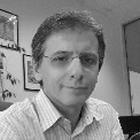 |
| INDUSTRIAL FORUM |
|
 |
| . |
|
|
Vito Lambertini
Centro Ricerche Fiat – CRF, Italy
Industrial Forum
Vito Guido Lambertini, Head of Polymers&Glass department within Group Materials Labs (CRF) that is the global Materials engineering and testing business line for all FCA and CNH-Industrial groups. Vito is responsible of Polymers&Glass department since 2013 managing development and innovation activities in the field of plastics, composites, elastomers, glazing and textiles. He holds an Engineering degree in Industrial Chemistry from the Politecnico of Torino in 1994. Vito has worked at CRF since 1994 contributing in the development of several automotive prototypes in the field of green & multifunctional polymers, composites, advanced surfaces smart materials. Currently, he is contributing in different EU projects on polymers and composites for automotive components (GreenLight, POLYGRAPH, PLATFORM, Graphene Core 1).
|
|
|
|
|
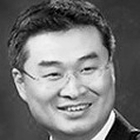 |
| INDUSTRIAL FORUM |
|
 |
| . |
|
|
Joung Hoon Lee
Standard Graphene, South Korea
Industrial Forum
|
|
|
|
|
 |
| KEYNOTE |
|
 |
| . |
|
|
Young Hee Lee
Sungkyunkwan University, South Korea
Keynote – Plenary Session
Professor Young Hee Lee obtained his Ph. D. at Kent State University in 1986 and did postdoctoral work in the Ames National Laboratory at Iowa and Michigan State University. He joined the physics faculty at Chonbuk National University in Korea and became a full professor in 1999, and then moved to the Sungkyunkwan University in Korea in 2001. In 2012 he was selected as the Director of the Center for Integrated Nanostructure Physics, Institute for Basic Science, located at Sungkyunkwan University, which he led for the first 3 years of its existence. Lee is a member of the Korea Academy of Science and Technology (2007) and nominated as the first Fellow of SKKU in 2007.
Young Hee Lee has received numerous major awards for his work in the field of carbon-based nanomaterials and nandevices, and two-dimensional materials physics; these include Science Award in Korean Physical Society (2005), Nomination as ‘The National Scholar of Korea’ (2005), the Presidential Award (2008), Lee Hsun Award, Chinese Academy of Sciences, China (2007), and Sudang Award (2014).
|
|
|
|
|
 |
| INDUSTRIAL FORUM |
|
 |
| . |
|
|
Max Lemme
Universität Siegen, Germany
Industrial Forum
Max Lemme received his Dipl.Ing. and Dr.-Ing. degree in Electrical Engineering from RWTH Aachen University in 1998 and 2003. In 1998 he joined nanotechnology start-up AMO GmbH, where he later became Head of the Technology Department. He has worked in the field of non-conventional nano-CMOS devices, including nanowire SOI-MOSFETs, novel high-k materials for gate stacks and, since 2005, graphene. His research on graphene devices includes the world’s first top-gated graphene MOSFET and the invention of a novel graphenebased nonvolatile memory device. In 2006 he received a young researchers’ award “NanoFutur” from the German Ministry for Education and Research and in 2007 he received a Lynen Research Fellowship form the Alexander von Humboldt Foundation. In 2008 he joined Harvard University in Cambridge, USA, where he pioneered a helium ion-based nanolithography method for graphene and investigated graphene photodetectors. In September 2010, he became Professor at KTH, where he is leading the graphene activities within the School of ICT. In 2012 he became Heisenberg Professor for Graphene-based Nanotechnology at the University of Siegen. His most recent work includes the first demonstration of graphene hot electron transistors (in collaboration with IHP) and graphenebased piezoresistive pressure sensors in an nanoelectromechanical system (NEMS). In addition, he has initiated research towards analog circuit design of graphene devices. Prof. Lemme is a Senior member of the IEEE and serves in several technical programme commitees for international conferences such as DRC (since 2013), IEDM (2008-2009), ESSDERC (since 2010), ULIS (since 2007) and EMRS.
|
|
|
|
|
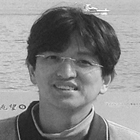 |
| INDUSTRIAL FORUM |
|
 |
| . |
|
|
Lain-Jong Li
King Abdullah University of Science and Technology, Saudi Arabia
Industrial Forum
Dr. Lain-Jong (Lance) Li received a BSc and an MSc in chemistry at National Taiwan University. After 5 years of R&D at Taiwan Semiconductor Manufacturing Company (1997-2002), he obtained his PhD from Oxford University in 2006. He was an assistant professor in Nanyang Tech. Univ. Singapore (2006-2009). Since 2010, he has become an Associate Prof. at Academia Sinica Taiwan and he started his Associate Professorship at KAUST in 2014. He has obtained Humboldt Research Fellowship for Experienced Researchers (Germany 2011) and Career Development Award Taiwan (2010). He has received Academia Sinica Research Awards and Wu Ta-Yu Research Awards in 2013. He is now having > 11200 citations, more than 210 SCI journals and h-index is 54 (ISI Web of knowledge). He is also a CTO of one start up company in Taiwan. His main research interest is synthesis of two-dimensional materials and their applications in electronics and energy-field.
|
|
|
|
|
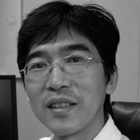 |
| INDUSTRIAL FORUM |
|
 |
| . |
|
|
Xuesong Li
University of Electronic Science and Technology of China, China
Industrial Forum
State Key Laboratory of Electronic Thin Films and Integrated Devices and School of Microelectronics and Solid State Electronics, University of Electronic Science and Technology of China, Chengdu, China
|
|
|
|
|
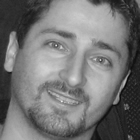 |
| INDUSTRIAL FORUM |
|
 |
| . |
|
|
Simone Ligi
GNext s.a.s., Italy
Industrial Forum
Dr. Simone Ligi is the director and co-founder of GNext. He has over ten years of experience in the field of polymer industry. His background spans from technical manager to sales manager, primarily with the multinational chemical company INEOS. In 2010 he begun analyzing potential business models for the just rising graphene industry, and developed a new process to produce graphene; an industrial scale up took over in 2013 by creation of GNext. Dr. Ligi has received his PhD in 2000 in Industrial Chemistry at University of Bologna. He is author of 6 patents and various scientific papers.
|
|
|
|
|
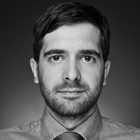 |
| INDUSTRIAL FORUM |
|
 |
| . |
|
|
Martin R. Lohe
Dresden University of Technology, Germany
Industrial Forum
Martin finished his PhD in inorganic chemistry and worked as a post-doc on the application and up-scaled production of porous materials before switching his research focus towards graphene and 2D materials. He has profound experience in the field of process development and optimization as well as up-scaling and commercializing inorganic specialty materials. In January 2015 he joined the Chair of Molecular Functional Materials with the focus on upscaling the electrochemical exfoliation of graphene. He is currently working as research group leader and industry project coordinator at the Chair for Molecular Functional Materials at the Center for Advancing Electronics Dresden.
|
|
|
|
|
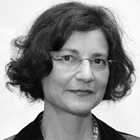 |
| INVITED |
|
 |
| . |
|
|
Annick Loiseau
ONERA, France
Invited – Plenary Session
Annick Loiseau leads the Research Group (GDR) on nanotubes and graphene, created by the National Scientific Research Center (CNRS) in 2009, created out of the GDR on nanotubes, at a national level in 1998 and then extended internationally in 2005. The objective: to promote exchanges and joint work between researchers in order to structure their research.
|
|
|
|
|
 |
| INDUSTRIAL FORUM |
|
 |
| . |
|
|
Avery T. Luedtke
MilliporeSigma-affiliate of Merck KGaA, Germany
Industrial Forum
Scientist at MilliporeSigma, an affiliate of Merck KGaA, Darmstadt, Germany After Sigma-Aldrich was purchased by Merck KGaA, Darmstadt Germany I retained the same position at the new company MilliporeSigma. At MilliporeSigma I am a scientist in Research and Development working in several areas of materials science. We develop new materials science products, which includes conception of the product, synthesis or manufacture of the first batch, and transfer of the procedure to the Production group.
|
|
|
|
|
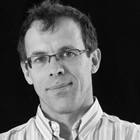 |
| INVITED |
|
 |
| . |
|
|
Xavier Marie
INSA-Toulouse, France
Invited – Plenary Session
Xavier Marie is Professor at the National Institute of Applied Sciences (INSA- University of Toulouse). He has joined the Institut Universitaire de France (IUF) in 2005 as a Junior member and in 2015 as a Senior member. He has been the Director of the Laboratory of Physics and Chemistry of Nano-Objects (LPCNO ; CNRS-INSA-UPS) from 2007 to 2010. He is currently in charge of the Laboratory of Excellence NEXT (Nano, EXtreme measurements and Theory) which brings together 200 permanent researchers from 6 laboratories in Toulouse.
|
|
|
|
|
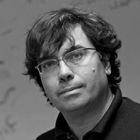 |
| WORKSHOP 3 |
|
 |
| . |
|
|
Nicola Marzari
EPFL Lausanne, Switzerland
Invited – Workshop 3: Theory & Simulation
Nicola Marzari holds a Laurea in physics from the University of Trieste (1992) and a PhD in physics from the University of Cambridge (1996). He was a NSF postdoctoral fellow at Rutgers University (1996-98) and a research scientist at the Naval Research Laboratory (1998-99) and at Princeton University (1999-01). In 2001 he was appointed assistant professor of computational materials science at the Massachusetts Institute of Technology, where he was promoted to associate professor in 2005 and to the Toyota Chair of Materials Engineering in 2009. In 2010 he joined the University of Oxford as its first Statutory Professor of Materials Modelling and director of the Materials Modelling Laboratory.
He moved to EPFL in 2011, as chair of Theory and Simulation of Materials; from 2014 he also directs the Swiss National Centre on Computational Design and Discovery of Novel Materials.
|
|
|
|
|
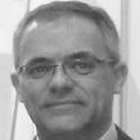 |
| INDUSTRIAL FORUM |
|
 |
| . |
|
|
César Merino Sánchez
Grupo Antolín Ingeniería, Spain
Industrial Forum
César Merino is the head of the department “ACM Advanced Carbon Materials” at the Tier 1 automotive company Grupo Antolin Ingeniería, SA. He holds a PhD in Chemistry from Complutense University Madrid.
ACM is producing carbon nanofibers for polymer composites by the so-called “floating catalyst technique” since 2004, and it is producing graphene related materials (GRM) since 2011.
GRM from Grupo Antolin are commercialized under the trade mark GRAnPH. The company is participating in the Graphene Flagship project.
Grupo Antolin offers products with high added value to outfit automobile interiors: Overheads & Soft Trim, Doors & Hard Trim, Seats & Metal, Lighting and Cockpits & Consoles.
|
|
|
|
|
 |
| INDUSTRIAL FORUM |
|
 |
| . |
|
|
Marco Molina
Leonardo Spa, Italy
Industrial Forum
Chief Technical Officer and Head of Capabilities, LoB Space, Airborne and Space System Division, Leonardo (Italy)
|
|
|
|
|
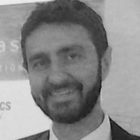 |
| INDUSTRIAL FORUM |
|
 |
| . |
|
|
Marco Monti
Consorzio Proplast, Italy
Industrial Forum
Marco Monti obtained his degree in Materials Engineering in 2005 and his PhD in Materials Nanotechnology in 2009 at University of Perugia, where he kept working as a postdoc researcher until 2011. Since 2011, he has been working in Proplast as a project manager of applied research projects. His research interests include thermoplastic and thermosetting polymers, nanocomposites, fiber reinforced composites, biopolymers and biocomposites. During his scientific career, he was visiting scientist at Polytechnic Institute of NYU (New York, 2006) and at Tecnalia research centre (San Sebastian – Spain, 2007). He is co-author of 24 scientific papers in peer reviewed journals, 1 chapter of the Wiley Encyclopedia of Composites, and several articles in technical magazines.
|
|
|
|
|
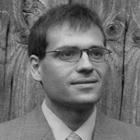 |
| INDUSTRIAL FORUM |
|
 |
| . |
|
|
Nikolaus Nestle
BASF Advanced Materials and Systems Research division, Germany
Industrial Forum
Dr. Nikolaus Nestle is a researcher at the BASF Advanced Materials and Systems Research division. He studied physics a the University of Ulm (Diploma 1993, PhD 1995). His work includes advanced materials characterization using NMR and X-ray methods, project work in building energetics and additive manufacturing technology. Prior to joining BASF in 2006, Dr. Nestle conducted Postdoc work at several universities and held various faculty positions at the Free University of Bolzano (Faculty of Design and Arts) and the TU Darmstadt (Department of Physics).
|
|
|
|
|
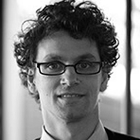 |
| INDUSTRIAL FORUM |
|
 |
| . |
|
|
Daniel Neumaier
AMO GmbH, Germany
Industrial Forum
Daniel Neumaier is head of the Graphene-Group at AMO GmbH since 2009. He studied physics at the Technical University of Munich and the University of Regensburg and received his Dipl. phys. degree in 2006. From 2006 until 2009 he worked at the University of Regensburg in the field of III/V spintronics. In 2009, he received the PhD (Dr. rer. nat.) degree from the University of Regensburg. He has managed several national research projects on graphene, has been the coordinative manager of the STREP project GRAND and has been leader of the carbon-electronics task in the NoE Nanosil. He is currently principle scientist in the project Graphene-CA, which is preparing the Graphene-Flagship project, and in the IP Grafol.
|
|
|
|
|
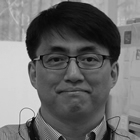 |
| INDUSTRIAL FORUM |
|
 |
| . |
|
|
Jong Hyun (Jon) Park
LG Display Co.,Ltd. , South Korea
Industrial Forum
Chief Research Engineer, OC(OLED Cell) Research/Development Team 3; LG Display Co.,Ltd.
|
|
|
|
|
 |
| INDUSTRIAL FORUM |
|
 |
| . |
|
|
Seongjun Park
Samsung Advanced Institute of Technology, South Korea
Industrial Forum
Seongjun Park, Ph.D. is a Vice President at Samsung Advanced Institute of Technology, Samsung Electronics. He is responsible for Nano Electronics Part in Device Lab including Graphene and 2D material-based research, Scanning Tunneling Microscopy, and three different sensor projects. His primary interests are developing devices in electronic, opto electronic, and energy applications using nano-structured materials including Graphene and 2D materials.
He received his B.S. degree in Chemical Engineering from Seoul National University (1994). He worked for three years as a software engineer, before he received Ph.D in Chemical Engineering from Stanford University (2003). His thesis topic was quantum mechanical simulations on the chemical reactivity of fullerenes and Carbon Nanotubes. He spent 2 years as research associate in Multi-Scale Simulation Lab at Stanford University. He then joined Intel (2005) where he investigated material selections for front and back-end of lines based on quantum mechanical simulations. Since he joined Samsung in 2010 and he's been leading Graphene and 2D material based device research.
He was the recipient of Nano Korea Symposium Award, Secretary Award from the Ministry of Science, Government of South Korea (2014), Annual Patent Award from Samsung Electronics (2014), Infinite Research Award from SAIT Samsung Electronics (2012, 2014), Research Master from SAIT Samsung Electronics (2013) and Samsung Best Paper Award for "Graphene Barristor" (2012).
|
|
|
|
|
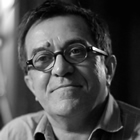 |
| WORKSHOP 1 |
|
 |
| . |
|
|
Bernard Plaçais
Laboratoire Pierre Aigrain - ENS /CNRS, France
Invited – Workshop 1: Optoelectronics and Nanophotonics
Directeur du GDR Physique Quantique Mésoscopique, CNRS, Laboratoire Pierre Aigrain (2000-).
Directeur de recherche CNRS, Head of Mesoscopic Physics group, ENS-Paris, Laboratoire Pierre Aigrain (2000-).
Chargé de recherche CNRS, Superconducting Vortex group at the ENS-Paris (1983-1999).
Visiting Scientist, Rotating Superfluid He3 ROTA group (Pr. Matti Krusius) at Otaniemi, Finland (1995-1996).
Habilitation, Superconducting Vortex group at ENS-Paris (1984-1990).
Thesis, Rotating Superfluid He4 group at ENS-Paris (1982-1983).
Diploma, DEA de Physique des Solides, Université Pierre et Marie Curie (UPMC, 1980)
Studies, Ecole de Physique et Chimie Industrielles (ESPCI) (1980)
|
|
|
|
|
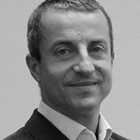 |
| WORKSHOP 5 |
|
 |
| . |
|
|
Nicola Pugno
University of Trento, Italy
Invited – Workshop 5: Mechanical properties and Nanomechanics
Professor of Solid and Structural Mechanics at the University of Trento;
Scientific Responsible of Graphene Nanocomposites at the Bruno Kessler Foundation;
Professor of Materials Science at the Queen Mary University of London;
Member of the Scientific and Technical Committee of the Italian Space Agency.
|
|
|
|
|
 |
| WORKSHOP 4 |
|
 |
| . |
|
|
Aleksandra Radenovic
EPFL – STI/SV - IBI – LBEN, Switzerland
Invited – Workshop 4: Energy
My lab works in the research field that can be termed single molecule biophysics. We develop techniques and methodologies based on optical imaging, biosensing and single molecule manipulation with the aim to monitor the behavior of individual biological molecules and complexes in vitro and in live cells. Our current research is focused on three major directions: (i) Developing and using nanopores as platform for molecular sensing and manipulation. In particular we focus on solid-state nanopores realized either in glass nanocapillaries, or on suspended 2d-material membranes and standard silicon-nitride membranes. (ii) Studying how biomolecules function, especially how proteins and nucleic acids interact, using force-based manipulation single-molecule techniques, in particular optical tweezers, optical wrench system, Anti- Brownian Electrokinetic (ABEL) trap and combination of nanopore/nanocapillaries with OT. (iii) Developing super-resolution optical microscopy, based on single molecule localizations (SMLM) in cells with molecular-scale resolution, with an aim to extract quantitative information.
|
|
|
|
|
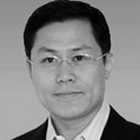 |
| INDUSTRIAL FORUM |
|
 |
| . |
|
|
Wencai Ren
Chinese Academy of Sciences, China
Industrial Forum
Wencai Ren is a professor at Institute of Metal Research (IMR), Chinese Academy of Sciences (CAS). He received his Ph. D. degree in materials science from IMR, CAS in 2005, and worked with Prof. Andre K. Geim at the University of Manchester from 2009 to 2010. His research interests mainly focus on the synthesis of graphene and other two-dimensional materials and their applications in energy storage, composites and optoelectronics. He has published over 70 peer-reviewed papers in Nature Mater., Nature Commun., PNAS, Adv. Mater., ACS Nano, J. Am. Chem. Soc. etc., and filed more than 20 patents.
|
|
|
|
|
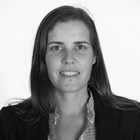 |
| INDUSTRIAL FORUM |
|
 |
| . |
|
|
María Rodríguez Gude
FIDAMC, Spain
Industrial Forum
|
|
|
|
|
 |
| INDUSTRIAL FORUM |
|
 |
| . |
|
|
Marco Romagnoli
CNIT, Italy
Industrial Forum
Marco Romagnoli (Consorzio Nazionale Interuniversitario per le Telecomunicazioni - CNIT, Italy) Head of Advanced Technologies for Photonic Integration at CNIT in Pisa, contract professor at Scuola Superiore S. Anna in Pisa, and former Director in R&D dept. He has over 30 years of experience in the field of research, especially in the area of photonic technologies for TLC. After a Laurea Degree in Physics at the University of Rome (La Sapienza), in 1983 he started his activity at IBM Research Center in San Jose. In 1984 he joined Fondazione Ugo Bordoni in the Optical Communications Department working on optical components and transmission systems. In 1998 he joined Pirelli. In Pirelli R&D Photonics served as director of Design and Characterization and Chief Scientist. In 2001 he pioneered the activity on Si Photonics within the framework of a 5 year long sponsored contract with MIT Microphotonics Center and started internally in Pirelli the development platform for optical components, specifically silica based PLC’s and Si based nanophotonics. In this period he contributed to the development of several products based on Ge:SiO2 (DWDM filters for ROADM, AWG, Tunable Dispersion compensator) in SiON (DWDM wavelength interleaver), SiN (4 chs OADM), Si (4 chs polarization independent tunable ROADM, tunable mirror for external cavity laser). All platforms (Ge:SiO2, SiON, SiN, SOI) were developed in Pirelli and completely characterized, the design kits of the basic building blocks were tested and qualified.
In Oct 2010 he joined PhotonIC Corp, a Si-Photonics company, as Director of Boston Operations and program manager at MIT (Massachusetts Institute of Technology) for the development of an optically interconnected multiprocessor Si chip. In this period he demonstrated for the first time electrically injected Ge laser. In this period SOI based based fabrications were processed at the advanced CMOS 65 nm line at CNSE (Albany) on 300mm SOI wafer size.
Marco Romagnoli is author of more than 170 journal papers and conference contributions, he is also inventor in more than 45 patents. He is in the technical committee of the major conferences in photonics (CLEO/QELS, CLEO Europe, ECOC, MNE, Group IV Photonics), he served as expert evaluator for EC in the 6th Framework Programme and since 2001 till 2006 coordinated a framework programme between Pirelli and MIT in which he pioneered the development of Silicon Photonics. Marco Romagnoli was awarded of the ‘Phillips Morris’ prize for the optical innovation in 1994 and in Pirelli he also got the title of Chief Scientist.
|
|
|
|
|
 |
| INDUSTRIAL FORUM |
|
 |
| . |
|
|
Minsu Seol
Samsung Advanced Institute of Technology, South Korea
Industrial Forum
|
|
|
|
|
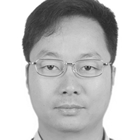 |
| INDUSTRIAL FORUM |
|
 |
| . |
|
|
Haofei Shi
Chongqing Institute of Green and Intelligent Technology, CAS, China
Industrial Forum
Haofei Shi is a professor of Chongqing Institute of Green and Intelligent Technology, Chinese Academy of Sciences. He started up the Chongqing Graphene Tech. Co., Ltd. and serves as the chief scientist of the company, where they completed the 1st and 2nd generation graphene film mass production line, and involved in the commercialization of graphene film. His research interests include synthesis of graphene film, fabrication of functional optoelectronics and electronics devices, and their application in information and energy related systems.
|
|
|
|
|
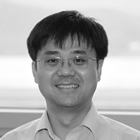 |
| INDUSTRIAL FORUM |
|
 |
| . |
|
|
Hyeon Suk Shin
Ulsan National Institute of Science and Technology, South Korea
Industrial Forum
Hyeon Suk Shin is an associate professor at Department of Chemistry and Department of Energy Engineering, Ulsan National Institute of Science and Technology (UNIST), Korea. He received his PhD from Department of Chemistry at POSTECH in 2002. After working as a postdoctoral fellow at University of Cambridge, UK and subsequently as a research Professor at POSTECH, he joined UNIST in 2008. He received Creative Knowledge Award (Minster Award by Ministry of Science, ICT, and Future Planning) in 2015, outstanding researcher award (Materials Chemistry Division, KCS) in 2015, the Faculty of the Year award of UNIST in 2014, and the Minister award of Ministry of Knowledge Economy, Korea in 2012. His current research is focused on 2D materials, including graphene, h-BN, transition metal dichalcogenides, and their heterostructures, and their applications for electrocatalysts and (opto)electronic devices.
|
|
|
|
|
 |
| WORKSHOP 1 |
|
 |
| . |
|
|
Justin Song
Nanyang Technological University, Singapore
Invited – Workshop 1: Optoelectronics and Nanophotonics
I'm a theoretical condensed matter physicist interested in emergent phenomena in quantum systems, broadly defined. Recently discovered quantum materials (e.g., Weyl and Dirac semimetals, 2D Dirac materials, van der Waals heterostructures, topological insulators) provide a ripe venue for this exploration. In many of these systems, the unique "winding" of the Bloch wavefunctions, electron interactions, intimate coupling between several layers in vertical as well as lateral heterostructures, and indeed the interplay of all three can yield qualitatively new phenomena. In some cases, new physics arising out of these materials has motivated new ideas in manipulating internal degrees of freedom such as energy, charge, valley, and spin.
|
|
|
|
|
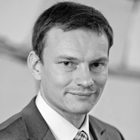 |
| INDUSTRIAL FORUM |
|
 |
| . |
|
|
Christoph Stampfer
RWTH Aachen University, Germany
Industrial Forum
Christoph Stampfer, born on 24 May 1977 in Bolzano (Italy) studied electrical engineering and technical physics at the Technical University of Vienna in Austria. He completed a doctorate in the field of micro and nano systems technology with Prof. C. Hierold at the Department of Mechanical and Process Engineering at ETH Zurich (Switzerland). His doctoral thesis in 2008 was awarded the ETH medal. From March 2007, he was a postdoctoral fellow in the nanoscience group of Prof. K. Ensslin in the department of physics at ETH Zurich where he conducted pioneering quantum transport experiments on graphene nanostructures. Since 2009, Mr. Stampfer research as JARA-FIT junior professor at RWTH Aachen University and Forschungszentrum Jülich where he deals with the basics of carbon based nanoelectronics. His work on graphene-based quantum electromechanical systems Him 2011 has a highly doped ERC Starting Grant introduced.
|
|
|
|
|
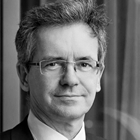 |
| INDUSTRIAL FORUM |
|
 |
| . |
|
|
Wlodzimierz Strupinski
Institute of Electronic Materials Technology, Poland
Industrial Forum
Dr. Wlodzimierz Strupinski received his PhD in physics from Warsaw University of Technology in 1988, and has more than 30 years’ experience in III-V materials technology for micro- and opto-electronics, silicon carbide compounds for high-power electronics, and graphene and other 2D nanomaterials. He also has expertise in developing and managing projects for government and the EU, such as the Graphene Flagship Project.
Dr. Strupinski interacts regularly with international research centers and commercial entities in the realm of III-V semiconductor compounds and graphene application. His expertise in nanotechnology and his experience in innovative research ensure ITME’s success.
|
|
|
|
|
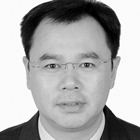 |
| INDUSTRIAL FORUM |
|
 |
| . |
|
|
Litao Sun
SEU-FEI Nano-Pico Center, Southeast University, China
Industrial Forum
Prof. Litao Sun currently serves as vice dean of School of Electronic Science and Engineering, Southeast University (SEU), the deputy director of Key Lab of MEMS of Ministry of Education, and the director of SEU-FEI Nano-Pico center. He is the founding chairman of IEEE Nanotechnology Council Nanjing Chapter. He received his PhD from the Shanghai Institute of Applied Physics, Chinese Academy of Sciences in 2005. He worked as a research fellow at University of Mainz, Germany from 2005 to 2008, and a visiting professor at University of Strasbourg, France from 2009 to 2010. Since 2008, he joined SEU and honored as a Distinguished Professor.
He is the member of standing committee of Chinese Electron Microscopy Society, member of China Graphene Standardization Committee, one of drafters of the No.1 standards for graphene in China and Review Panel member of Graphene Flagship, European Commission. He is the author and co-author of over 100 papers on international journals including Science, Nature Nanotechnology, Nature Materials, etc.
|
|
|
|
|
 |
| INVITED |
|
 |
| . |
|
|
Mauricio Terrones
The Pennsylvania State University, USA
Invited – Plenary Session
Mauricio Terrones, obtained his B.Sc. degree in Engineering Physics with first class honors at Universidad Iberoamericana, and was distinguished as the Best Student of Mexico in Engineering Physics in 1992. In 1994 he started his doctorate degree with Sir Prof. Harold W. Kroto (Nobel Laureate, FRS), and received his D.Phil. degree from University of Sussex in 1998. He has co-authored more than 400 publications in international journals, and counts with more than 28,000 citations to his work (His H index is 83; Google Scholar H=91). He has published in Nature, Science, Phys. Rev. Lett., Nano Lett., Nature Nanotechnology, Nature Materials, Nature Communications, Nature Chemistry, ACS Nano, PNAS, etc. In 1999, he was awarded the Alexander von Humboldt Fellowship, and carried out research at the Max-Planck Institut für Metallforschung (Stuttgart, Germany). In 2000, he was recipient of the Mexican National Prize for Chemistry. He also received the Javed Husain Prize and the Albert Einstein medal from UNESCO in 2001. In 2005, he received the TWAS Prize in Engineering Physics for his contributions in the field of carbon-based nanomaterials. This prize is given by the Academy of Sciences of the Developing world, and Mauricio is the youngest scientist ever to receive any TWAS award. In 2005, Terrones also received the “José Antonio Villaseñor y Sánchez” Prize, awarded by the governor of the state of San Luis Potosí, for his contributions to Nanoscience. He is member of the Mexican Academy of Sciences since 2002. In 2007, Terrones was elected the National Contact Point in Nanotechnology with the European Union. In 2012 was elected fellow of the American Association for the Advancement of Science (AAAS). In 2015, he was elected fellow of the Royal Society of Chemistry (UK) and was awarded the Jubilee Professorship from Chalmers University of Technology (Sweden). In 2016, Mauricio was awarded the Faculty Scholar Medal in Physical Sciences (Penn State). Mauricio is also Associate Editor of Carbon, 2D Materials, Journal of Materials Research and Nature Scientific Reports. He is Professor of Physics, Chemistry and Materials Science & Engineering with tenure at Penn State University. He is also the Founder Director of the Center for 2-Dimensional and Layered Materials at Penn State, and also the NSF-IUCRC Center for Atomically Thin Multifunctional Coatings (ATOMIC).
|
|
|
|
|
 |
| WORKSHOP 1 |
|
 |
| . |
|
|
Klaas-Jan Tielrooij
ICFO - The Institute of Photonic Sciences, Spain
Invited – Workshop 1: Optoelectronics and Nanophotonics
Multidisciplinary scientist with fascination for light-matter interaction, in particular ultrafast phenemona at the nanoscale, with >25 peer-reviewed publications that have been cited >2000 times in total (h-index 16).
|
|
|
|
|
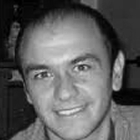 |
| INDUSTRIAL FORUM |
|
 |
| . |
|
|
Felice Torrisi
Cambridge Graphene Centre, University of Cambridge, UK
Industrial Forum
Dr Felice Torrisi is a Research Associate in the Cambridge Graphene Centre of the University of Cambridge and Fellow of Trinity College. He graduated at the University of Catania, Italy, after a research period at the Institute of Microelectronics and Microsystems of the Italian National Research Council. He joined the Department of Engineering at the University of Cambridge in October 2008 as PhD student and then as Research associate in 2012.
|
|
|
|
|
 |
| INDUSTRIAL FORUM |
|
 |
| . |
|
|
Florina Truica-Marasescu
ALCERECO, Canada
Industrial Forum
Dr. Florina Truica-Marasescu is ALCERECO’s Senior Scientist and Technical Project Leader. With 17 years experience in academic research and R&D in the fields of surface science/chemistry, surface and interface engineering, nanotechnologies, material and analytical sciences, and plasma and radiation-assisted physico-chemical processes, she is also a junior member of Quebec’s Order of Engineers.
After graduating with a Bachelor’s degree in Engineering Physics from University of Bucharest, Dr. Truica-Marasescu earned her M.Sc. degree in Material Surface Sciences at École Nationale Supérieure des Arts et Industries de Strasbourg. And upon her award of the prestigious “Bourse d’excellence” (Excellence Scholarship) by the Government of Quebec, she earned her Ph.D. at l’École Polytechnique de Montréal
|
|
|
|
|
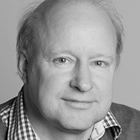 |
| WORKSHOP 6 |
|
 |
| . |
|
|
Bart van Wees
University of Groningen, The Netherlands
Invited – Workshop 6: Spintronics & Valleytronics
Professor of Applied Physics - University of Groningen “I am a physicist in quantum electronic transport. I have contributed to discoveries in e.g. mesoscopic systems, spintronics and spincaloritronics. With my group we introduced new device physics that combine experimental concepts and fundamental understanding, complemented by theoretical descriptions. My recent research focuses at single molecule electronics and spin caloritronics. I am a member of the Royal Netherlands Academy of Arts and Sciences (KNAW). I lead the Spintronics Workpackage in the EU Graphene Flagship.”
|
|
|
|
|
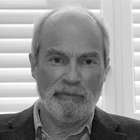 |
| INDUSTRIAL FORUM |
|
 |
| . |
|
|
Rune Wendelbo
Abalonyx, Norway
Industrial Forum
CEO / General Manager at Abalonyx AS
Worked as researcher at SINTEF in Oslo from 1988 - 2005. Worked with preparation and characterization of catalysts and adsorbents in SINTEF. Established Abalonyx in 2005 and Graphene Batteries in 2012.
|
|
|
|
|
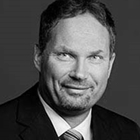 |
| INDUSTRIAL FORUM |
|
 |
| . |
|
|
Christian Wenger
IHP Microelectronics, Germany
Industrial Forum
|
|
|
|
|
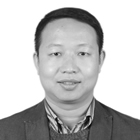 |
| WORKSHOP 4 |
|
 |
| . |
|
|
Yanwu Zhu
USTC, China
Invited – Workshop 4: Energy
Dr. Yanwu Zhu is a professor in Materials Science and Engineering at the University of Science and Technology of China (USTC). He received his MS (2003) from Peking University (China) and PhD (2007) from National University of Singapore (NUS), both in physics. He worked as a research fellow in NUS Nanoscience & Nanotechnology Initiative, Singapore before he moved to the University of Texas at Austin, where he joined Prof. Rodney Ruoff’s group for graphene materials studies till July 2011. He has published more than 100 research papers on the topics of nanomaterials, applied physics and applied chemistry. So far these papers have been cited by more than 16000 times and the highest citation is about 3000. Dr. Zhu was awarded 2011 Scopus Young Researcher Award and selected as the second batch of Young Talent Thousand program by the central government of China (2011), New Century Excellent Talents Program in University by MOE (2012) and Young Excellent Young Scientist by NSFC (2013). Dr. Zhu is the co-founder of The Sixth Element Inc. Ltd (Changzhou), one of the biggest graphene production companies in China.
|
|
|
|
|
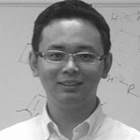 |
| WORKSHOP 4 |
|
 |
| . |
|
|
Xiaodong Zhuang
Technische Universität Dresden, Germany
Invited – Workshop 4: Energy
Xiaodong received his BsE (2006) and PhD (2011) degrees from East China University of Science and Technology. Since then, he has joined Prof. Feng’s groups and focused on graphene-coupled 2D porous polymers and 2D porous carbons for energy storage and conversion
|
|
|
|
|
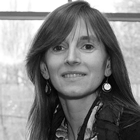 |
| INDUSTRIAL FORUM |
|
 |
| . |
|
|
Amaia Zurutuza
Graphenea, Spain
Industrial Forum
Amaia Zurutuza obtained her PhD in Polymer Chemistry from the University of Strathclyde in Glasgow (UK) in 2002. During her PhD she worked in the research of novel polymers for biomedical applications. After completing her PhD she did two post-doctoral fellowships working within two European projects in the field of molecularly imprinted polymers. At the beginning of 2004, she joined Controlled Therapeutics Scotland Ltd. (UK) where she was a Senior Polymer Scientist working in the R&D of new controlled drug delivery systems. Her research contribution in Controlled Therapeutics lead to the publication of 3 patents in novel biodegradable and biostable polymers for controlling drug delivery. In April 2010 she joined Graphenea as the Scientific Director.
|
|
|
|
|
| |
|
|
|
|
|
 |
|